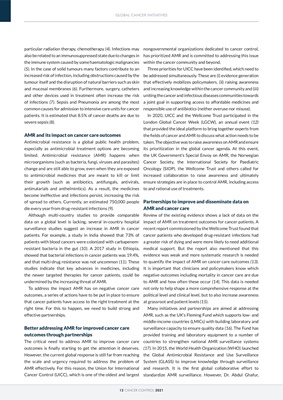
GLOBAL CANCER INITIATIVES
12 CANCER CONTROL 2021
particular radiation therapy, chemotherapy (4). Infections may
also be related to an immunosuppressed state due to changes in
the immune system caused by some haematologic malignancies
(5). In the case of solid tumours many factors contribute to an
increased risk of infection, including obstructions caused by the
tumour itself and the disruption of natural barriers such as skin
and mucosal membranes (6). Furthermore, surgery, catheters
and other devices used in treatment often increase the risk
of infections (7). Sepsis and Pneumonia are among the most
common causes for admission to intensive care units for cancer
patients. It is estimated that 8.5% of cancer deaths are due to
severe sepsis (8).
AMR and its impact on cancer care outcomes
Antimicrobial resistance is a global public health problem,
especially as antimicrobial treatment options are becoming
limited. Antimicrobial resistance (AMR) happens when
microorganisms (such as bacteria, fungi, viruses and parasites)
change and are still able to grow, even when they are exposed
to antimicrobial medicines that are meant to kill or limit
their growth (such as antibiotics, antifungals, antivirals,
antimalarials and anthelmintics). As a result, the medicines
become ineffective and infections persist, increasing the risk
of spread to others. Currently, an estimated 750,000 people
die every year from drug-resistant infections (9).
Although multi-country studies to provide comparable
data on a global level is lacking, several in-country hospital
surveillance studies suggest an increase in AMR in cancer
patients. For example, a study in India showed that 73% of
patients with blood cancers were colonized with carbapenemresistant bacteria in the gut (10).
A 2017 study in Ethiopia,
showed that bacterial infections in cancer patients was 19.4%,
and that multi-drug resistance was not uncommon (11). These
studies indicate that key advances in medicines, including
the newer targeted therapies for cancer patients, could be
undermined by the increasing threat of AMR.
To address the impact AMR has on negative cancer care
outcomes, a series of actions have to be put in place to ensure
that cancer patients have access to the right treatment at the
right time. For this to happen, we need to build strong and
effective partnerships.
Better addressing AMR for improved cancer care
outcomes through partnerships
The critical need to address AMR to improve cancer care
outcomes is finally starting to get the attention it deserves.
However, the current global response is still far from reaching
the scale and urgency required to address the problem of
AMR effectively. For this reason, the Union for International
Cancer Control (UICC), which is one of the oldest and largest nongovernmental organizations dedicated to cancer control,
has prioritized AMR and is committed to addressing this issue
within the cancer community and beyond.
Three priorities for UICC have been identified, which need to
be addressed simultaneously. These are (i) evidence generation
that effectively mobilizes policymakers, (ii) raising awareness
and increasing knowledge within the cancer community and (iii)
uniting the cancer and infectious diseases communities towards
a joint goal in supporting access to affordable medicines and
responsible use of antibiotics (neither overuse nor misuse).
In 2020, UICC and the Wellcome Trust participated in the
London Global Cancer Week (LGCW), an annual event (12)
that provided the ideal platform to bring together experts from
the fields of cancer and AMR to discuss what action needs to be
taken. The objective was to raise awareness on AMR and ensure
its prioritization in the global cancer agenda. At this event,
the UK Government's Special Envoy on AMR, the Norwegian
Cancer Society, the International Society for Paediatric
Oncology (SIOP), the Wellcome Trust and others called for
increased collaboration to raise awareness and ultimately
ensure strategies are in place to control AMR, including access
to and rational use of treatments.
Partnerships to improve and disseminate data on
AMR and cancer care
Review of the existing evidence shows a lack of data on the
impact of AMR on treatment outcomes for cancer patients. A
recent report commissioned by the Wellcome Trust found that
cancer patients who developed drug-resistant infections had
a greater risk of dying and were more likely to need additional
medical support. But the report also mentioned that this
evidence was weak and more systematic research is needed
to quantify the impact of AMR on cancer care outcomes (13).
It is important that clinicians and policymakers know which
negative outcomes including mortality in cancer care are due
to AMR and how often these occur (14). This data is needed
not only to help shape a more comprehensive response at the
political level and clinical level, but to also increase awareness
at grassroot and patient levels (15).
Many initiatives and partnerships are aimed at addressing
AMR, such as the UK's Fleming Fund which supports low- and
middle-income countries (LMICs) with building laboratory and
surveillance capacity to ensure quality data (16). The Fund has
provided training and laboratory equipment to a number of
countries to strengthen national AMR surveillance systems
(17). In 2015, the World Health Organization (WHO) launched
the Global Antimicrobial Resistance and Use Surveillance
System (GLASS) to improve knowledge through surveillance
and research. It is the first global collaborative effort to
standardize AMR surveillance. However, Dr. Abdul Ghafur,